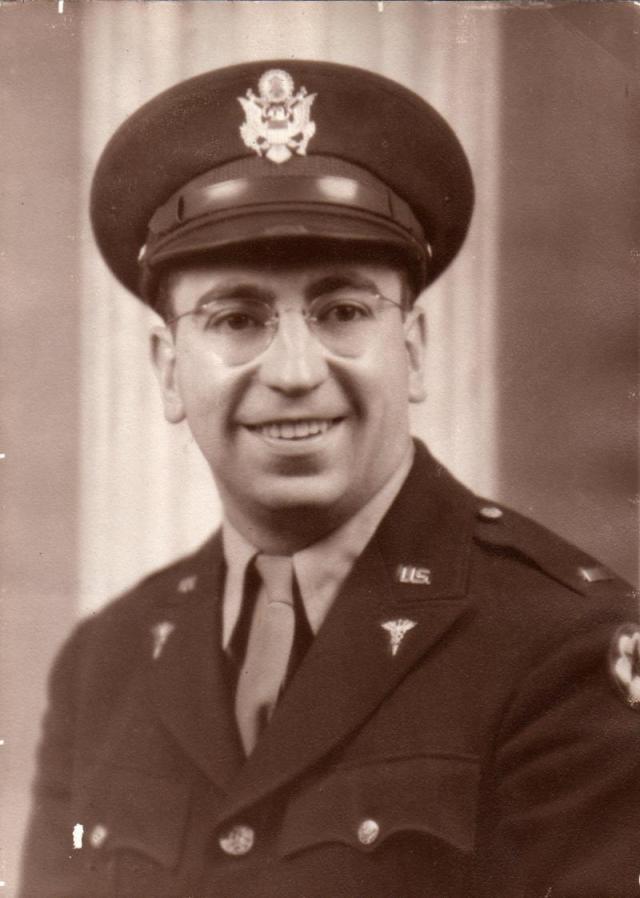At 96 years old, Sherwood Davies has a sharp memory and has seen a lot: Europe during World War II and the tuberculosis sanitarium in the Adirondacks and Dwight Eisenhower. He remembers exactly where he was when King George VI declared war on Germany - a speech now famous in a film with Colin Firth.
Even so, the Patriot Flight he took to Washington, D.C., in June ranks as a memory to cherish. Patriot Flights honor WWII, Korean and Vietnam War vets by flying them to Washington, D.C., for a day of visiting the memorials that honor them as well as other sites, free of charge.
"I was extremely impressed. It was something I'll never forget I'm sure," he said.
But in 1943, Davies was just a newly married 26-year old, logging hours working for the New York State Health Department. That year he received a direct commissioned to serve as a second lieutenant in the Sanitation Corps in the European Theater.
He went to medical field service school in Carlisle, Pa., then was shipped overseas in February 1944. There, he was stationed in Northern Ireland for about six months. Before the D-Day invasion his outfit was shipped just north of the British coast, where, he said, they handled between 7,000 and 8,000 troops.
"As a sanitary engineer I was involved in providing and making sure we had a safe water supply, that we disposed of our waste, any problems with lice or bed bugs and essentially the environmental living of the troops that we had," Davies said.
At the most trying times, Davies said the troops were only allotted about 1.5 gallons of water per day per soldier for washing, cooking and drinking. That was about three weeks before the invasion.
"It was rough living at the time, not as rough as the troops had it in France," he said.
In fact, the scariest moment Davies had during his time in uniform now provides a laugh. After weeks of sleeping in tents, Davies and a friend managed to get a hotel room in London during a short leave. They were asleep in their beds when loud noises work them.
"In the middle of the night the German B-2s — the sirens blew and you could hear the women with high heels running down into air raid shelters," he said.
He turned to his friend, who said he didn't want to move because it was the first bed he'd had in so long. They decided to stay.
"If the bombs fell we were gonna be in it," he said.
"He had me laughing," Deborah Gordon, his daughter, said about the hotel story. She served as his "guardian" on the Patriot Flight. During the day, that was the first time she heard stories like these.
"You just had goosebumps the whole time," she said. "He would tell me cute little stories. ... But he doesn't talk about the war much."
But on the Patriot Flight, he did, Gordon said.
"You don't get to talk with people that have been through what many of them had been through. Many of them had been through a lot worse than what I had been through, and their experience and their interest in life - I think to me it was an expression on somebody's part we want to do something for you.
"The recipients, these old vets, were really appreciative of everything that was done for them and on behalf of them. Time moves along but when you look back ... it's rather thoughtful of the people who really go out of their way to make it enjoyable and rewarding," Davies said.
Motorcyclists displaying flags greeted them Honor guards and bands greeted the veterans in the airport before departure, and a banner and parade met them at the arrival airport. They saw the war memorials, the Iwo Jima monument and the changing of the guard at Arlington National Cemetery. They even, he said, saw where big band leader Glenn Miller was buried.
But it was the people who made the difference - the volunteers, of course, but even strangers.
All day passersby - even middle-school aged kids - showed their gratitude, through the airports and at the memorials and Arlington National Cemetery were coming up to shake the veterans hands and thank them for their service, Gordon said.
"All along the way, it's hard for me to explain but the response of the people to recognize vets that had been in service 50, 60 years ago: it was very, very revealing and most appreciative," Davies said.
"For me the most meaningful wasn't (the memorial) ... The memorial was wonderful, but the memorial didn't bring me to tears as much as the people and the amount of effort and the admiration for the vets," Gordon said.



